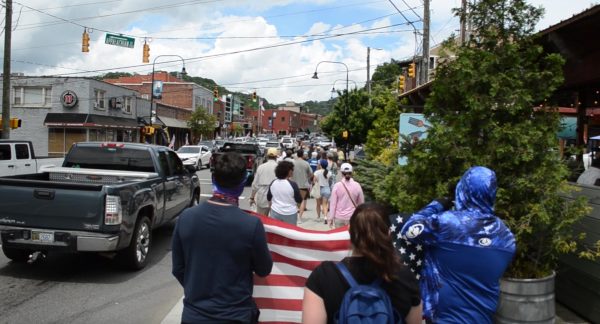Letter to the Editor: Sexual assaults go unreported, App stands idly by
October 13, 2022
Dear Editors,
I am a lecturer in Rhetoric and Composition, and I am an App State alum. I arrived as a transfer student from Harold Washington City College in Chicago in the fall of 2004 and graduated with a BA in English in the fall of 2007.
I was here when App State beat Michigan in that infamous away game, when Bob Dylan played at the Convocation Center, and when Anne Belk Hall was still the campus library building. Sometimes I look around at new dorms and the newly renovated Sanford Hall, and it seems obvious that so much has changed here. But the truth is, some things are still unfortunately true, like the staggering rate of sexual assault and intimate partner violence.
If your first instinct is to check the App State annual report on fire and crime, which details the last three years of campus reported events for everything from robbery to liquor law arrests to dating violence, you would be lulled into thinking I am exaggerating facts. In 2020, there were only four reports of rape, for example. In a student body of nearly 20,000, that doesn’t sound staggering at all. In fact, it sounds like a very low number; a rate that even the most nervous parent would find solace in when researching where to send their child to college. But the problem with this statistic’s accuracy is that two students raped that year were mine, and they never reported.
I became a faculty member in English in the fall of 2016, and during the past 13 regular and seven summer semesters of teaching rhetoric and composition classes more than a dozen students have disclosed to me their experiences with sexual assault and intimate partner violence. In 2020, two students bravely disclosed that they had been raped, one off campus after a party, and one in a dorm. Last week alone, there have been two more.
In my experience, students more often than not choose to avoid filing a formal police report. I have not yet known a student who pressed charges and initiated a formal investigation. This isn’t a novelty; in the United States, only roughly 20% of rapes are reported to police. Less than 1% lead to felony convictions. These odds don’t do anything to convince victims that reporting their experience will lead to any meaningful justice. And it doesn’t seem to be significantly more likely here at App State.
Between April 2011 and August 2020, 16of our students were disciplined for “sexual misconduct: non-consensual sexual contact” and “sexual misconduct: non-consensual sexual intercourse” according to the now-required release of these kinds of records, made possible because of a judgement handed down by the North Carolina Supreme Court in 2020. Yet according to the campus crime reports, there were 14 reports of rape between 2018 and 2020 alone. It begs the question, what happened in those other reported cases? Why was no one disciplined?
I recognize that rape cases, along with other instances of intimate partner violence and sexual assault, are difficult to prove and difficult to convict. I have watched it come down to the victim’s word against their perpetrator’s; it doesn’t take a law degree to notice that victims seem easier to disbelieve. I can’t help but be outraged and concerned by that reality. Of course, I can’t change the way the world works. But I can call attention to the way our campus works. And in the words of our recent Visiting Writers Series reader, Neema Avashia, “The conditions adults create for young people ultimately shape who those young people end up becoming.”
When the second student of the week disclosed that she had been assaulted just a few days earlier, I spoke to her about her options: the Title IX office, the police, OASIS. Her confusion startled me. “What is OASIS?” “What does this have to do with Title IX?” It struck me as ludicrous that a sophomore who had been on this campus for a full year now, who was living and working in this community, didn’t know what the Title IX office was for, and had never heard of OASIS, the Watauga and Avery County’s advocacy center and shelter for victims of domestic and sexual violence.
But in reflecting back on my college experience on this campus, living and working in this county, I realize I never knew what the Title IX office was either. I likely didn’t even know it existed. Only because of my weekly senior year study sessions at Boone Bagelry, which has consistently kept an OASIS flier with tear-tags taped to the women’s bathroom door for as long as I can remember, did I know anything about the organization. I did know several friends who were victims of sexual or interpersonal violence while we were students at App State. I know they never reported their perpetrators. I know they didn’t call Title IX or OASIS; at most, one friend went to several appointments at the Counseling Center, and one told her parents, who arranged for some counseling in their hometown over summer break.
So what conditions are we creating for our young people at App State? I have two primary concerns. One, we are not informing our students clearly enough or often enough about the resources available to them if they are victims of this kind of intimate violence. They do not know who to call, so in many cases they call no one, or report only to a trusted teacher or friend. Two, we are not creating a campus environment which states unequivocally that we encourage reporting, we believe victims, and we will discipline perpetrators. I feel confident that some of our administration would disagree with me, but the proof is in the data. If two students I taught in 2020 reported their rape to me but not to campus authorities, and only four students reported their rape to App State, either my office is an extraordinarily unique reporting safe haven or there are many more victims who simply didn’t know how to, or didn’t feel safe, reporting.
There are ways we as a campus could address these issues. I won’t claim to have the answers but I have a few ideas, and as I tell my students, a few ideas will always be where the difficult process of problem solving begins. First, I think that those recognizable OASIS fliers with their convenient tear tags should be posted and regularly maintained, in every single bathroom stall on this campus. Sexual and intimate partner violence doesn’t just happen to cis women, and these fliers need to be accessible to students regardless of gender identity. While buildings on campus have rules and regulations about what can be posted and in which shared spaces, making allowances for this particular display would be well justified.
Second, campus student support services need to be capable of efficiently and effectively supporting students. Even when I was a student it could be challenging to get an appointment at the Counseling Center. Now, students explain, it is nearly impossible. I can imagine so; as our campus focus narrowed to reaching enrollment of 20,000 students, our campus services were not bolstered proportionally. A lack of sufficient housing is not the only shortage problem we face.
Third, we need to review and reimagine how students report these kinds of experiences. In 2016, Jessica Ladd gave a TED Talk about Callisto, a system for college campuses that provides students with a confidential method of reporting. This system, or one like it, could provide students with more motivation to report, more support when they choose to press charges and more confidence that there will be some kind of meaningful justice.
Would our campus crime statistics change as a result? Yes. If more students feel safe reporting, the annual numbers will increase, and App State would have to deal with the discomfort of explaining why. But the truth is, we all know the statistics are wrong. It is no secret in this country that the least frequently reported but most frequently perpetrated personal violence is sexual in nature.
There is an elephant in the living room. What if App State decided to acknowledge it, face it and wrestle with it in public and meaningful ways; what if we loudly supported the processes that lead to significant change? What if our campus could be seen not just as another safe space for perpetrators to commit sexual and intimate partner violence without recourse, but as a safe space for victims to report, seek justice and receive support? What message could we send the world around us? What conditions could we create for the young people we serve?
Thank you for your time,
Katy Abrams











Benji C • Oct 19, 2022 at 10:30 pm
ASU admin would rather not expend the $$ to bring justice to those who deserve it in these cases. They’d rather just keep dumping it into football. I’m really sorry this has happened. One day this black & gold empire will collapse.
MuChao • Oct 22, 2022 at 6:04 am
Oh, it already is collapsing. Just look at the staff and faculty retention numbers and (complete lack of) morale. This place is finished.